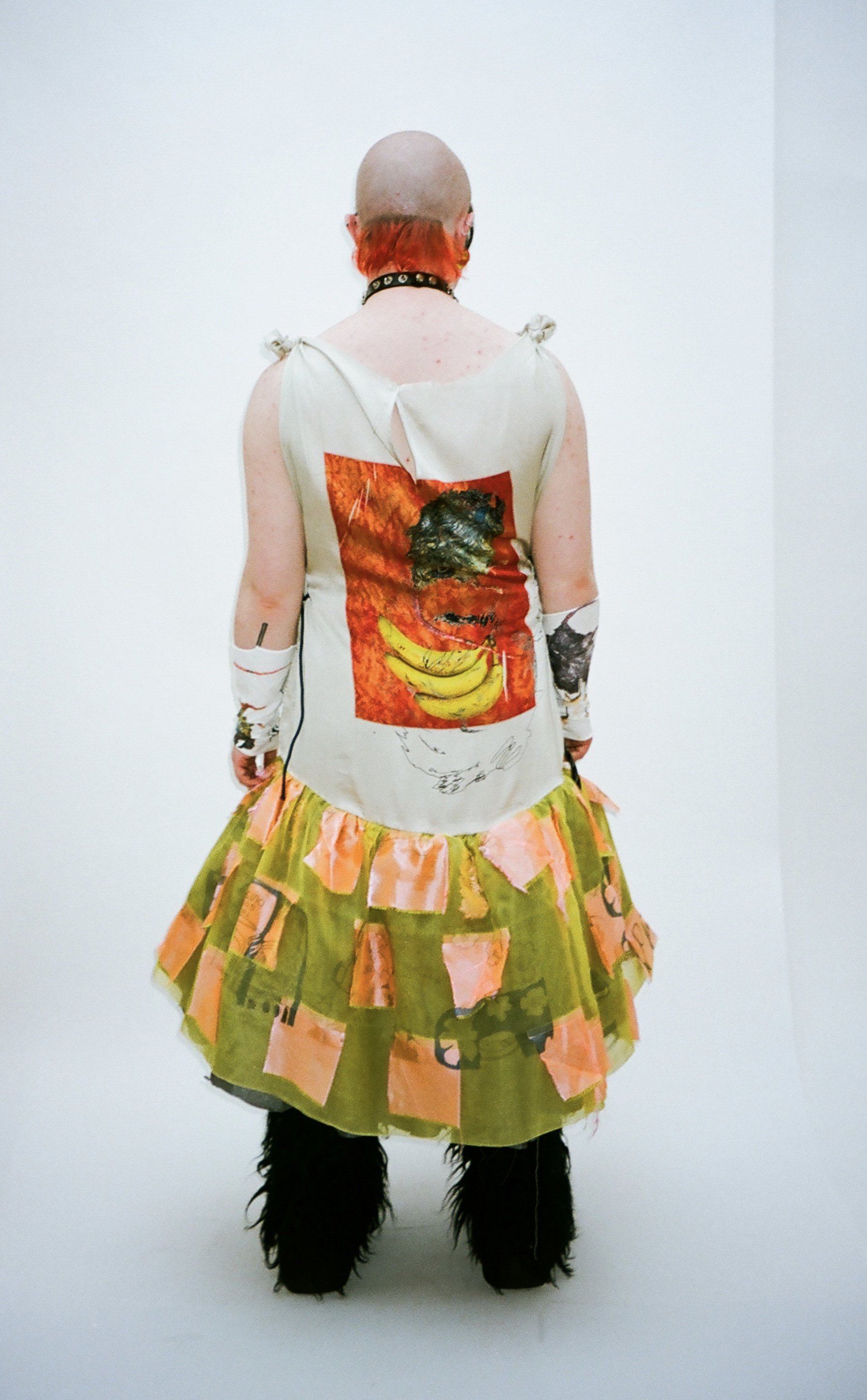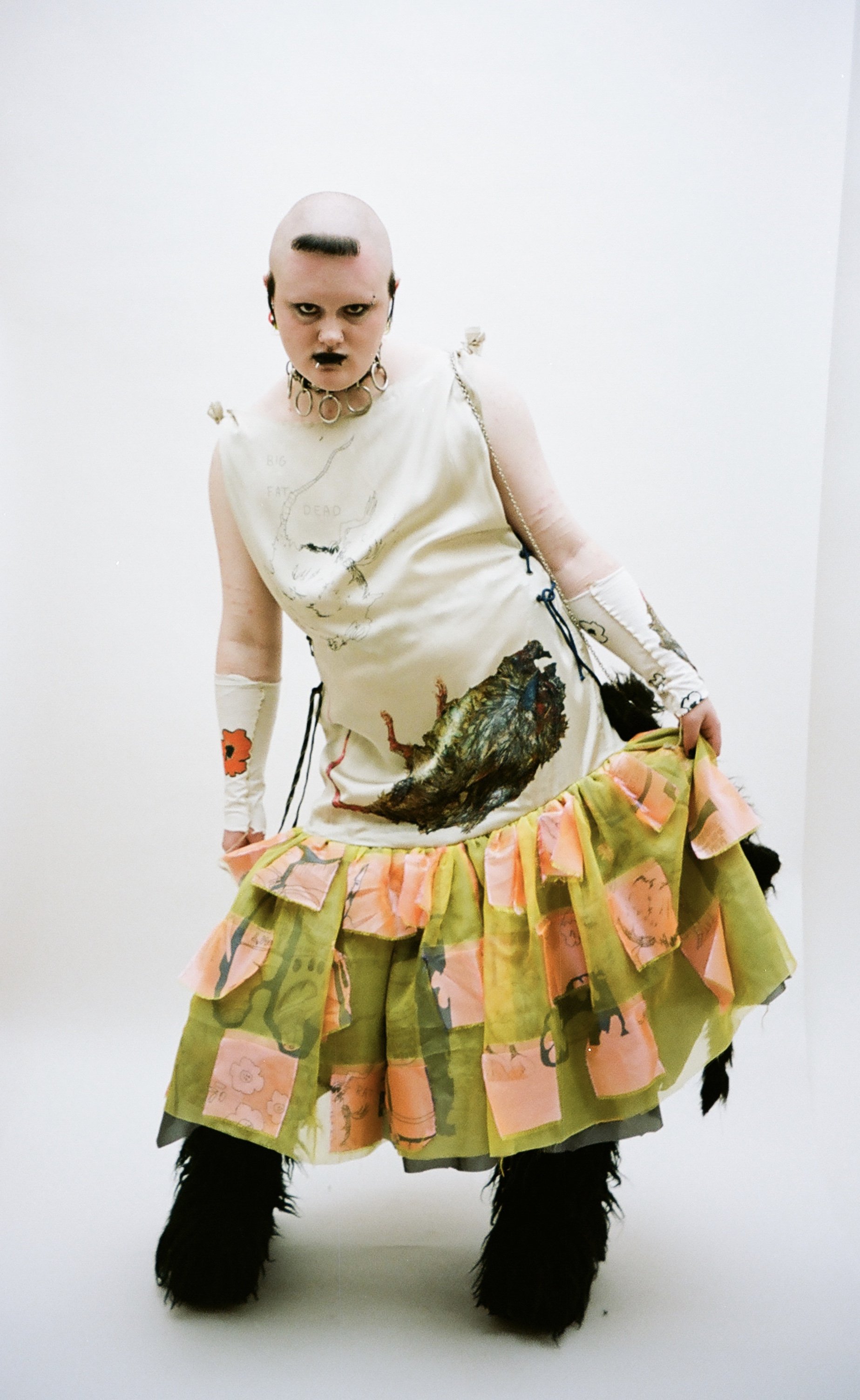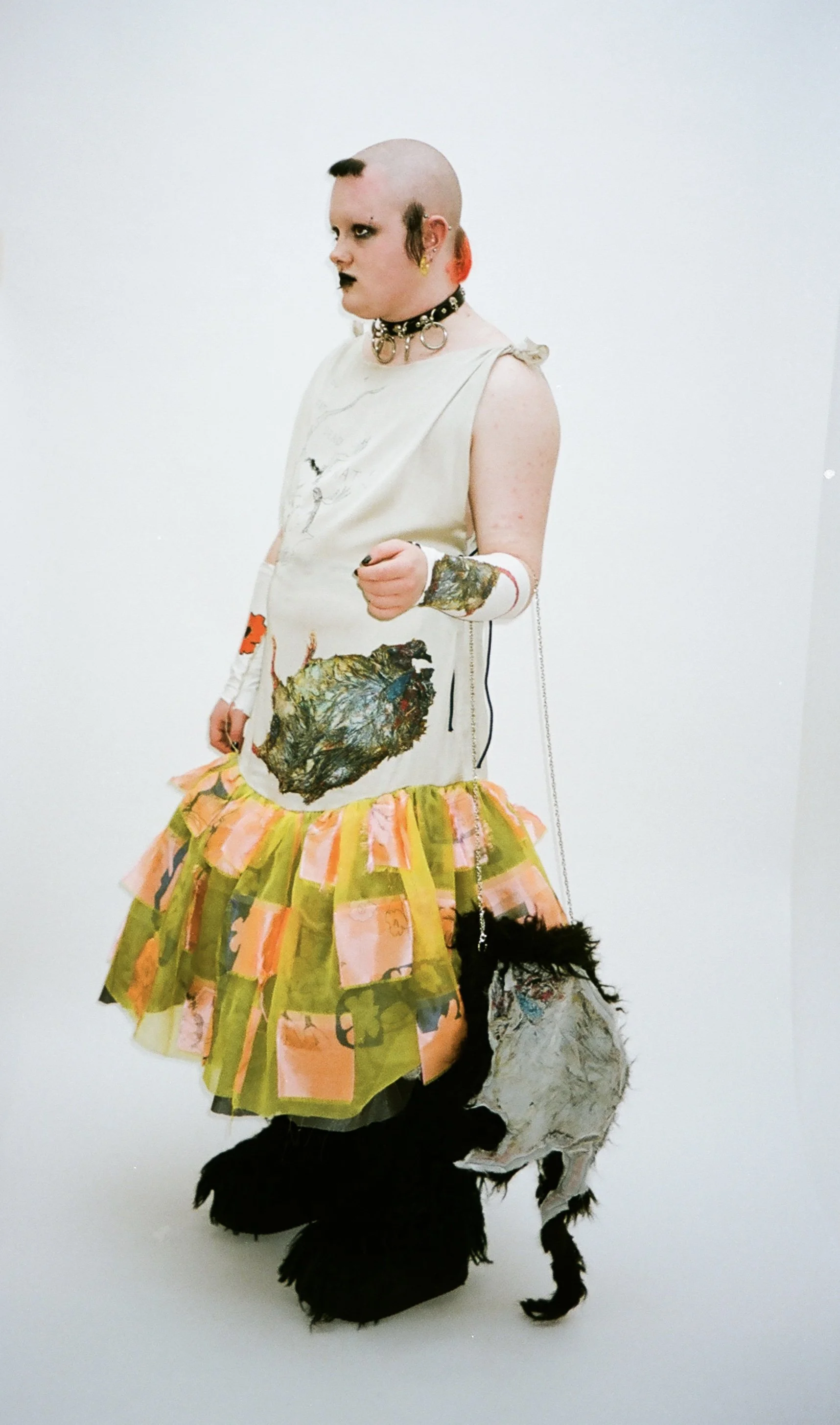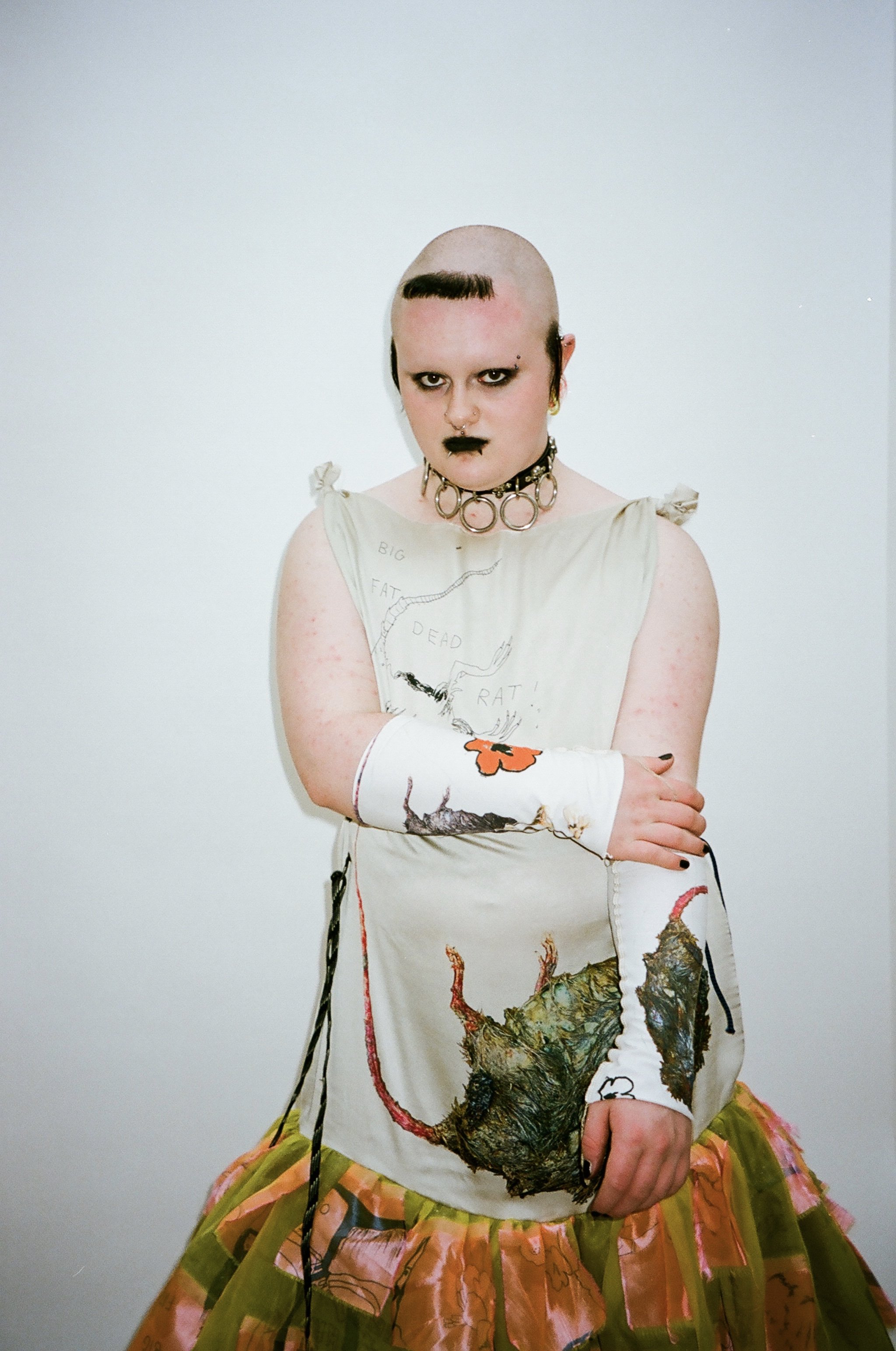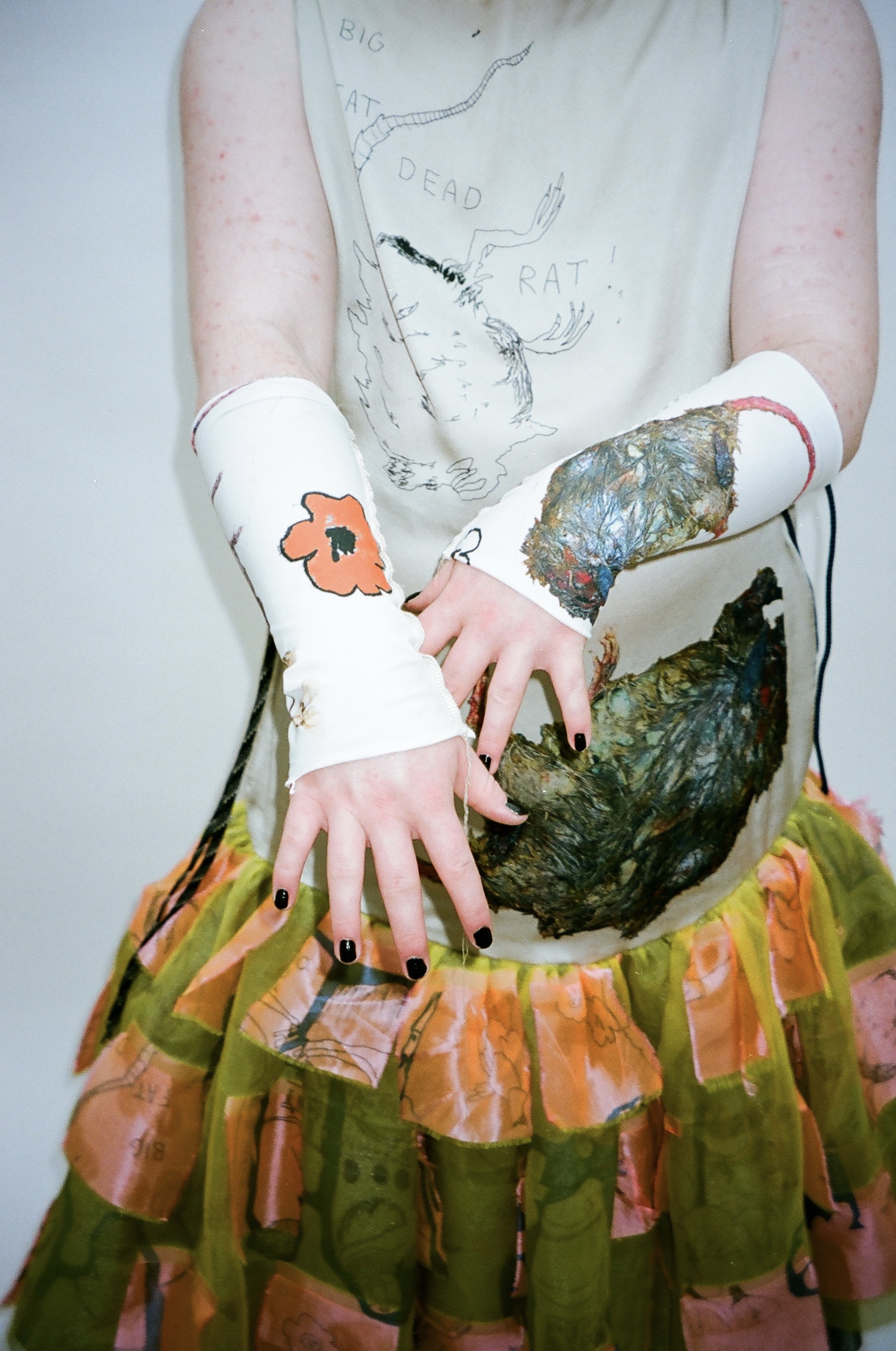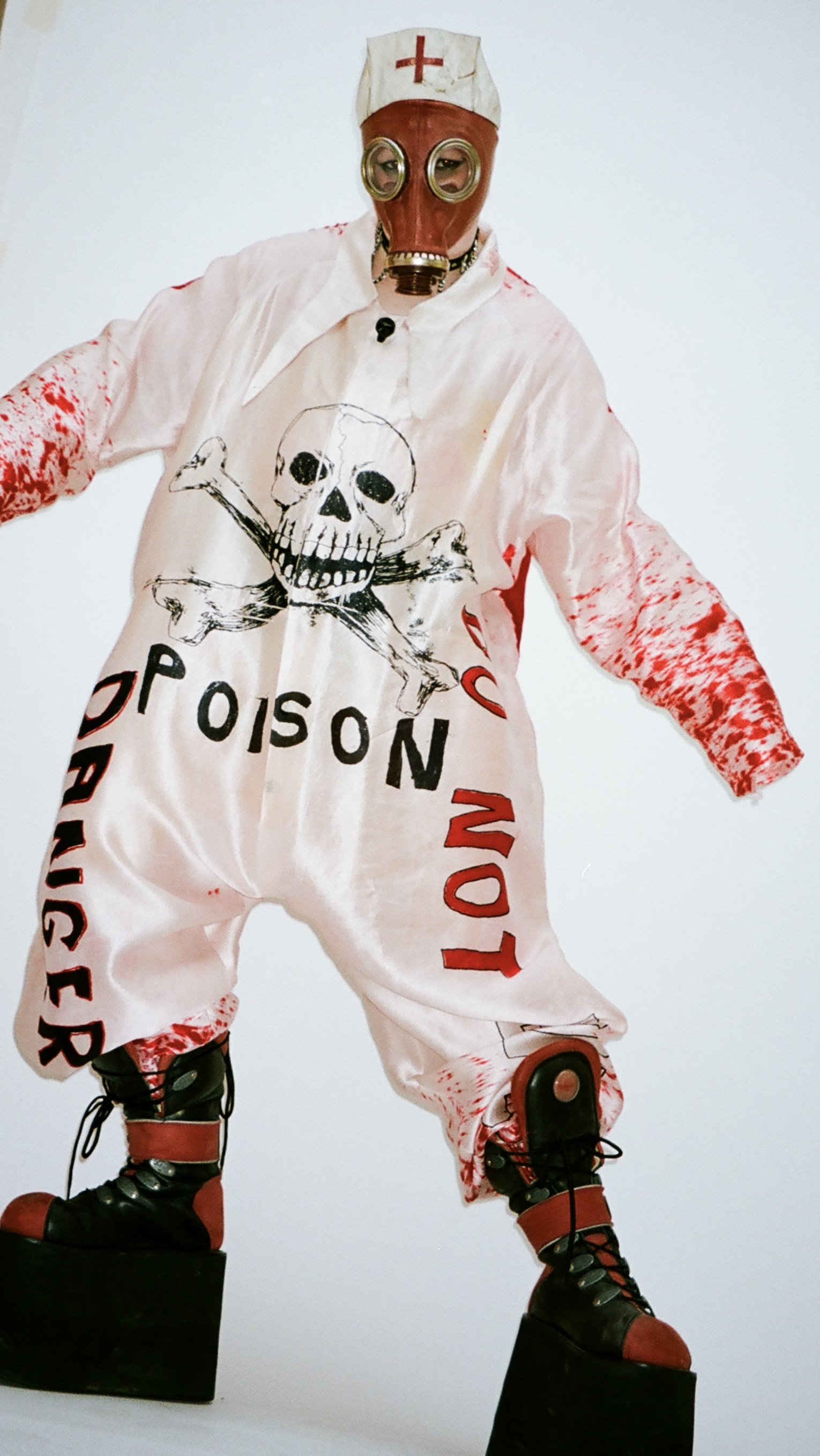Designer Spotlight: Bartholomew Heritage
Interview and photographs by Eerie Rose, interviewee, model & garments by Bartholomew Heritage
Please tell us a little about who you are, and an introduction to your work!
Hello! I’m 22, originally from a very rural village on the Solway Firth, and I’m currently in my 3rd year (placement year) of Fashion Print at Central Saint Martins. I’m autistic and use my design practice as a method of non-verbal communication to express what I can’t fully with words. The concepts always reflect how I experience the world as an autistic person, because my creative process is my way of processing the world. Overreaching each individual project concept my work is tied together by themes of the grotesque, as it seems to come naturally in me as an autistic, transgender person to want to reject the typical conformative body of ‘beautiful’ fashion and delve further into my own perceived disgustingness.
How did you find yourself studying fashion and becoming a designer? Was it always on the cards, or a more recent interest?
Honestly I’ve wanted to go into fashion since my early teens, even though I didn’t necessarily think it was achievable back then. I remember a lot of art teachers telling me I wouldn’t be able to cope with working in fashion, until I started my art foundation year in Carlisle where I was actually encouraged to do the fashion pathway. It was also during this year where a traditional printing workshop reinforced my love for print, and I decided I had to find a university where I could continue to do both fashion and print together - not just one or the other.
How have you found university? I also studied fashion, and am very familiar with the library all-nighters, endless canteen coffees, and constant aches from ferrying what feels like the contents of a whole studio back and forth every day…but also the chance to meet amazing tutors, and people. Does any of that reflect your experience, or have you had a different time?
Overall my experience at CSM has been very positive. I don’t think I could find anywhere else that would allow me as much creative freedom in my work, I haven’t been prevented or discouraged from exploring any of my concepts. I do wish there was more understanding of students with autism or other hidden disabilities, though this is a problem everywhere really.
I’ve definitely sprained ankles before carrying suitcases of stuff back and forth every day, and there is such an amazing variety of people at CSM, but I struggle a lot socially so I often don’t know how to interact with people, or can’t tell if someone wants to interact with me. I really want to try and talk to more people in final year before we graduate.
What is your favourite way to work - what does a typical (or an ideal) studio day look like to you?
In the studio, ideally a full day of one thing is best for me. Whether it's a full day printing, dyeing or sewing etc, I find it’s easier to be productive without having to switch tasks throughout the day. Working from home I’m similar, I tend to print or dye things in the daytime, then in the evening I might do some sewing once I’ve lost daylight. I like listening to podcasts while I work too!
What are some of your biggest inspirations, and how do they feed into the pieces you create?
This question is basically like asking me about my special interests to be honest, as they inevitably become my inspiration whether I want them to or not. One of my biggest inspirations would be the band Slipknot, their image, music and attitude specifically, as well as looking further out into nu-metal / alt-metal and the 90s-00s goth scene.
My other biggest inspiration would be the band Dir En Grey, their concept and music, then looking wider into visual-kei and the ero-guro subgenre in more depth. Both bands fit well into the theory of the grotesque, so even though not all of my projects take direct visual inspiration from them, there’s still one theme that ties everything together through the music I listen to, the media I consume and the way I conceptualise my life into my work.
Did any of these influence your choice to specialise in print? If not, what did?
Not really! I knew I wanted to specialise in print long before I started listening to either band. Hopefully I’m not sounding repetitive but it’s really to do with me being autistic - making me drawn to colour and texture, having a brain that seeks out connections, correlations and patterns, and feeling satisfaction from the tactile nature of print! My foundation tutor told me that I “see the world through print” and she was definitely right, before I even understood it myself.
I’ve noticed a huge shift in the popularity of and respect for practices such as knitting and crochet in the last year or so - has print been getting the same treatment and respect, perhaps as people learn more about the process?
I’m not sure honestly, hand knitting and crochet are much more accessible for people to do at home, whereas screen printing needs more space and expensive equipment. I think amongst textiles students screen printing seems to be a popular specialism, but less so amongst fashion students who generally seem to prefer digital print.
Do you think the ever-changing landscape of social media has affected this? I found myself discovering whole new printing techniques via Tiktok, as well as gaining perspective on how long certain outcomes take to achieve, or how intricate the process is. I wonder if this education is helping people have a new outlook on the clothes they buy and the money they’re happy to spend on them, as previously they may not have realised the workmanship that goes into a screen printed piece, for example.
I’m definitely out of the loop with this! I’ve never opened tiktok in my life, and I only use instagram because I know I need some kind of online presence as a designer. I’m working hard to improve the way I use instagram as a creative, but I struggle a lot with posting, replying and keeping up to date. The only comment I can make is that I’ve noticed when trying to sell online, like depop for example, people really don’t seem to understand or respect the value of what I make. I regularly receive offers around £20 for hand made pieces, whereas events and pop-ups made for independent designers attract people who are aware of our niche market, so I’ve had much more success selling my pieces for a good price.
What are your thoughts on the way social media is currently impacting the fashion industry? Do you feel particularly positive about new horizons, or frustrated at how the algorithms categorise creative work?
I have a lot of mixed thoughts about it really, like I’m aware that so much of the fashion industry relies on social media now, which does have benefits of being able to reach so many people and connect with stylists/photographers/other creatives. But at the same time that all relies on having a large number of followers to actually be seen, which excludes people who struggle with or don’t like social media.
In other words I think it’s amazing how social media can give emerging designers a huge online platform, but I wish that wasn’t the only way to survive in the industry.
How does your experience as a person living in 2022 impact and shape your design outcomes? Do you feel you’re fighting against ever rising odds in the current climate, or do you feel there are any specific circumstances in this day and age that have helped your practice?
As I mentioned, my process is so caught up in my own very individual experience of the world that it’s almost completely separated from larger current events going on around me. Outside of my work it’s very important to me to be socially and politically aware of what’s happening, but I’ve learned from experience to keep this separate from my design practice for the sake of my mental health. If anything, the current political climate might still shape my design outcomes without me really noticing or intending it to, because obviously to an extent it will affect my day to day personal experiences.
While there is still a long way to go, the fashion industry is looking towards being more sustainable, especially amongst younger designers and independent brands. Do you feel there is pressure to be almost flawless when it comes to your ecological footprint for new designers? How do you feel about that - do you feel it is fair for younger designers to carry the weight of changing the industry, or do you see it instead as an opportunity to carry the torch and lead the next generation into a new and more conscious era?
The push towards sustainability obviously is important, but I honestly think there’s far too much pressure on us. It feels very intentional to constantly push fashion students about sustainability to avoid putting pressure on the massive established industry that’s actually causing all the damage. Young and independent designers already are far more conscious, a lot of us consider the sustainability of our work automatically, and we value ethical production over cutting costs with outsourced labour. People really need to stop nit-picking the sustainability of student work, which is already far more sustainable than previous generations, and focus on holding the wider industry accountable.
What would you like to see change in the fashion industry, if you could change one thing for the better?
What I want to see is a rejection of the notion that fashion is only for the thin, white, typically attractive and able-bodied person. But to get there would require so many institutional changes, even starting in fashion education we need improved disability services in universities so that more disabled students can study fashion with the right accommodations. We need to diversify the student body by making these courses accessible to any socio-economic background. And once it’s possible for all socio-economic backgrounds to even apply to study fashion, we will still need a reform in the admissions process to make sure that class and racial biases are not being upheld.
What I’m trying to say is that right now we have a system rigged in the favour of exclusivity, with fashion institutions automatically being more accessible to rich, white, able bodied students who go on to design for people like themselves. What we need is more working class, POC and disabled students who will go on to make a real change in the establishment. But I am aware of how unrealistic that all sounds unfortunately.
What is next for you and your work?
I’m going to keep working on my online presence, try to grow as an independent designer, but also just try and enjoy my placement year without stressing too much about myself before final year!
You can follow Bartholomew Heritage on Instagram to see more of his work, and to find out about upcoming pop-up shops or ways to purchase pieces or support.

